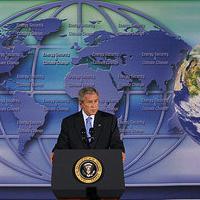UNITED NATIONS, New York -- A U.N.-sponsored summit last week on climate change laid the groundwork for further unified global action on limiting greenhouse gasses, but a separate meeting organized by the Bush administration rolled out a unilateral agenda that did little more than widen the gap between the United States and other countries. First came Monday's summit, convened by U.N. Secretary-General Ban Ki-moon at the United Nations, and attended by numerous world leaders and heads of government. The gathering was a prelude to the U.N. conference on climate change in Bali in December, which the world organization hopes will launch a new climate agreement to pick up where the Kyoto Protocol leaves off in 2012, when the emission reduction targets it had established expire. If last week's events are any indication, the United States -- which never signed the Kyoto Protocol, and is therefore not currently bound by emission targets -- is no closer to joining in the collective effort. This, observers say, has had a knock-on effect on other notable holdouts among rapidly developing industrial nations, notably China and India: they have said they are looking for adequate, visible, and measurable action by the United States, a lead they can see and follow.
Outlook Cloudy in the Climate Change Debate

